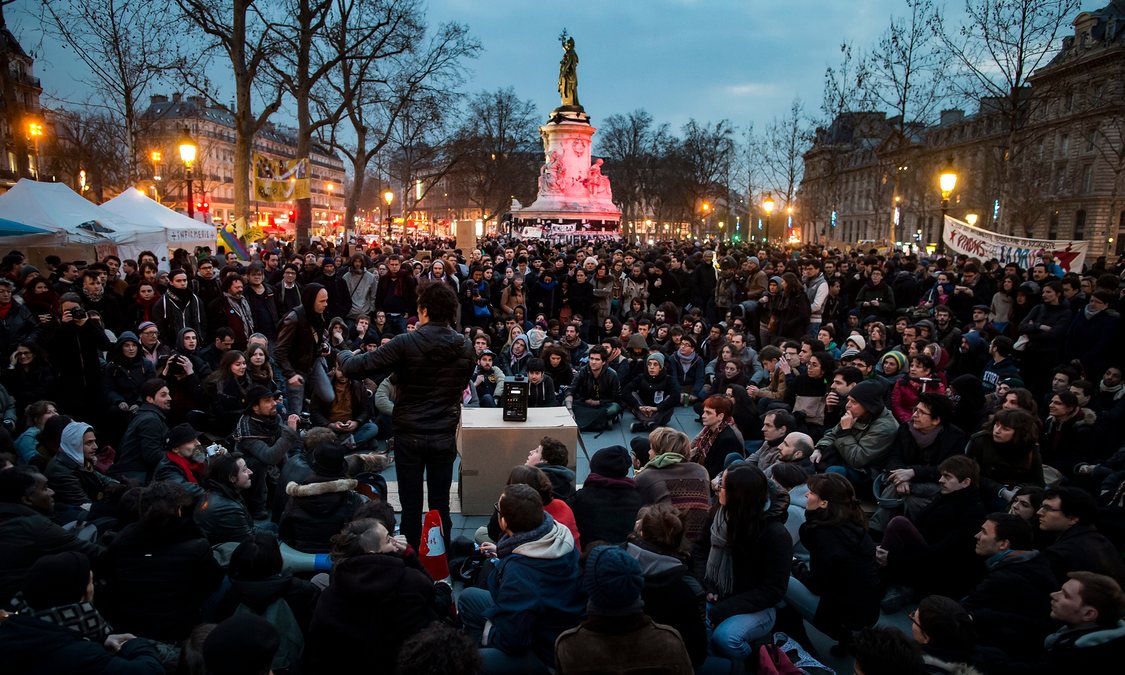By Naomi Byron
Striking workers from the railways, car factories, supermarkets, hospitals, offices and banks joined students and youth in mass demonstrations across France on 28 April. Led by lycée (further education) students, the Paris march was 60,000 strong, according to the CGT union federation. This was the latest day of action in a growing movement against a labour law proposed by the misnamed ‘socialist’ government of President Hollande. It makes it much easier for the bosses to lay off workers and reduce redundancy payments. It would also make it easier to increase the working week by reducing overtime payments (France’s statutory working week is 35 hours). The El Khomri law (named after the labour minister) has triggered an explosion of anger from below, particularly from the youth, who have the most to lose from it. There is a deep anger and disgust against not only the proposed law, but the whole political system as well. There were around 70,000 on the May Day demo in Paris, significantly more than last year.
Egalité, the paper of Gauche Révolutionaire (sister organisation of the Socialist Party in France) calls for the politics of the government to be thrown into the bin. This got enthusiastic agreement from the vast majority of people we spoke to; from lycée students to trade unionists and people who have been drawn into political life through the ‘Nuit Debout’ a movement which first appeared in the Place de la République in Paris. It has echoes of the Occupy and Indignados movements: a public space for discussion where every voice can be heard, with regular ‘popular assemblies’.
Nuit Debout has spread to many other towns and cities, and is being organised in the banlieues (big housing estates on the outskirts of a city) in Paris. Though some on the left have criticised the Nuit Debout, for example for having very long meetings without sufficient direction, Gauche Révolutionaire has pointed out that every movement needs time to find its feet. The space for discussion and debate, when there is such ferment in society, has to be welcomed with open arms. In fact, the unions and the wider movement can take many ideas from the Nuit Debout. Not interminable discussions of course, but to call general assemblies in every workplace, lycée, university, school and estate, to discuss how best to defeat the El Khomri law, and all the other questions which face French society.
General strike
The law was presented to parliament on 3 May, so it is an urgent question. But to defeat a government that is determined to force their unjust laws through, a strong and determined general strike is needed. Unfortunately the leaders of the trade unions have hesitated for months. Under pressure from their activists and the lycée students’ movement, the CGT the most militant trade union federation has called for national days of action, including strikes. Its congress recently voted for general assemblies to be called in every workplace to discuss and decide to take “renewable” strike action. But this would have been much more concrete if it had also named a date to begin such a strike. The strikes and demonstrations of 28 April were angry and powerful, but many who participated are still to some extent uncertain as to how to achieve a general strike. The same evening, the Nuit Debout invited the unions to an assembly at the Place de la République in Paris. This was a major step forward, both in beginning to bring these different sections of the movement together and also because when Philippe Martinez, the CGT general secretary, spoke, he had to concede that he was indeed in favour of a general strike when someone in the assembly asked the question. If so, then he should name the date! Many activists expect such a call, and there are new strikes and struggles breaking out all the time.
The 28 April demonstrations were smaller than the last big day of action, and there is much discussion about how to involve wider layers. By encouraging everyone to discuss not only how to defeat the El Khomri law but how a general strike can be organised and what other things the movement should be fighting for, thousands, then millions, can be drawn into the struggle.
Police violence
There is much enthusiasm to discuss alternatives to capitalism. Gauche Révolutionaire points out that a general strike is not just a powerful stoppage. The organisation that it requires by the working class can create the very beginning of a new society run by workers, for workers. Despite the presence of many tens of thousands of trade unionists across the country and a mainly very peaceful day, violence between police and some demonstrators was the main news story in the capitalist media.
Police violence and repression has been used regularly, especially against the youth. Teargas was used against demonstrators in several cities, and shocking videos of the CRS (riot police) dragging people out of the Nuit Debout at the Place de la République and beating them up in massive cloud of teargas, have been all over the internet. France is still officially in a state of emergency after the November Paris attacks and the following attacks in Brussels. Le Parisien quoted a gendarme police officer shocked by the anger against the police: “A year ago, after the Charlie Hebdo attack, the French were applauding us.” How quickly things can change!












